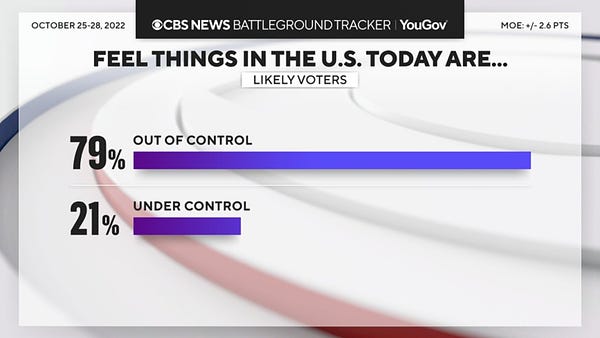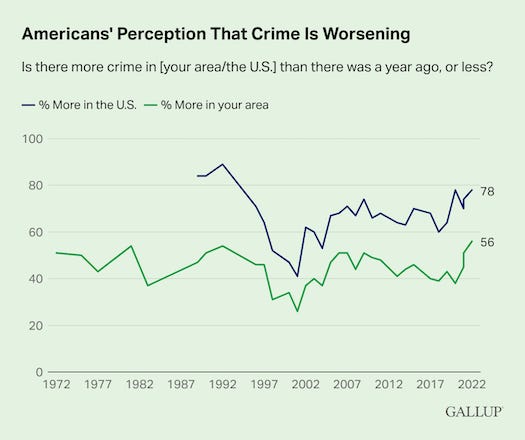Today’s posts that caught my eye:
Goldman Sachs economists said they now expect the US Federal Reserve to raise interest rates to 5%, higher than previously predicted.
Record-high 56% in U.S. perceive local crime has increased.
No Powerball jackpot winner again — so Monday’s drawing will be for $1 billion.
Thank you for subscribing. Know someone who should check out the newsletter? Let them!
The World
How Russia secretly takes grain from occupied Ukraine: An investigation by the Financial Times into the illicit grain trade out of occupied Ukraine reveals a complex shadow operation managed by private companies and arms of the Russian state itself. A trove of documents seen by the FT — including invoices, cargo manifests, receipts, and certificates of origin — provides a complete paper trail for one shipment of grain, from occupied Zaporizhzhia to the global market. The paperwork, which traces the journey of a 2,675 metric tonne shipment of milling wheat, has been corroborated by satellite imagery, shipping transponder data, boat-spotting in northern Turkey and interviews with smugglers and traders. And one small shipment from a quiet port gives insight into how the illicit trade operates, and how different Russian institutions work together to provide cover stories for private companies and ships involved. (Financial Times)
Traders are bracing for a fresh spike in grain prices after Russia’s exit from a deal allowing Ukraine crops to move from the Black Sea to the countries most in need of them roils markets anew. The sudden move by Russia has left leaders scrambling to rescue the UN-and-Turkey-brokered agreement credited with saving vulnerable populations from risk of starvation. (Bloomberg)
Russia’s Black Sea flagship damaged in Crimea drone attack, video suggests. (The Guardian)
Luis Inacio Lula da Silva narrowly defeated President Jair Bolsonaro in a runoff election that marked a stunning comeback for the leftist former president and the end of Brazil's most right-wing government in decades. The Supreme Electoral Court declared Lula the next president, with 50.9% of votes compared with 49.1% for Bolsonaro. The 77-year-old Lula's inauguration is scheduled for Jan. 1. Lula, in a speech on Sunday night, said he would unite a divided country and ensure that Brazilians "put down arms that never should have been taken up," while inviting international cooperation to preserve the Amazon rainforest and make global trade more fair. (Reuters)
A row between the US and Saudi Arabia over oil production and Washington’s diminishing influence in the Middle East give China a chance to expand its footprint in the region, experts say. Strengthened ties between China and countries in the Middle East, with President Xi Jinping reportedly set to visit Saudi Arabia and attend summit meetings with regional leaders after securing a third term as Communist Party general secretary, have raised the prospect of China stepping in as the US pulls back from the region. (South China Morning Post)
Week of large-scale events shows Hong Kong is ‘open for business’ and offers clear advantages, treasury chief says. Treasury minister Christopher Hui reveals Hong Kong FinTech Week is set to draw more than 12,000 attendees, down from earlier estimate of about 20,000 Busy week ahead, with city to also host international investment summit from Tuesday to Thursday, followed by Friday kick-off of Hong Kong Sevens. (South China Morning Post)
Biggest iPhone factory in China pledges safe passage after Covid-19 outbreak sends workers fleeing on foot. (South China Morning Post)
Support for Prime Minister Fumio Kishida's cabinet dipped to a new low of 42% in the latest Nikkei/TV Tokyo poll, as Japan's public remains dissatisfied over the Unification Church's ties with officials in the government and ruling Liberal Democratic Party. (Nikkei Asia Review)
After 16 months in opposition, Benjamin Netanyahu is plotting his return as Israel’s prime minister, teaming up with the nation’s far right in a bid to replace the unwieldy coalition that removed him from office. The path back to power for Israel’s longest-serving prime minister hinges on support from a number of once-fringe politicians who have deepened domestic strife and drawn rebukes from the US. Among them is Itamar Ben-Gvir, a 46-year-old lawyer whose support may be critical to the former premier. (Bloomberg)
Iran charges female journalists who helped break Amini’s story with being CIA spies. (Washington Post)
Record-High 56% in U.S. Perceive Local Crime Has Increased: Americans are more likely now than at any time over the past five decades to say there is more crime in their local area than there was a year ago. The 56% of U.S. adults who report an increase in crime where they live marks a five-percentage-point uptick since last year and is the highest by two points in Gallup's trend dating back to 1972. Public perceptions of an increase in crime at the national level have also edged up since last year, as 78% say there is now more crime in the U.S. This is tied with the 2020 measure. The record high was 89% in 1992, when crime rates soared in the U.S. (Gallup)
In the first two months after the Supreme Court overturned Roe v. Wade on June 24, legal abortions nationwide declined by more than 10,000, a drop of about 6 percent, according to the first attempt at a nationwide count of abortions since the decision. Thirteen states banned or severely restricted abortion during those months, mostly in the South, and legal abortions in those states fell to close to zero, according to detailed estimates made by a consortium of academics and abortion providers. Nine more states added major abortion restrictions, and legal abortions in those states fell by a third. In states with bans and restrictions, there were about 22,000 fewer abortions in July and August, compared with the baseline of April, before the decision. In states where abortion remained legal, the number of abortions increased by roughly 12,000, or 11 percent. That suggests that around half of women who were unable to get abortions in states with bans traveled to another state to get one. (New York Times)
Pediatric hospitals short on beds as respiratory illnesses surge among children: After two years of mild flu seasons, Texas hospitals are seeing high rates of respiratory illnesses among children. A shortage of pediatric beds has forced some families to seek treatment out of state. (Texas Tribune)
Polls:
About half of Americans say either the economy or inflation is the most important issue in their vote for Congress, making pocketbook issues by far the most dominant in the run up to the midterm elections, according to a new ABC News/Ipsos poll. Taken individually, 26% identify the economy as their single most important issue determining their vote while 23% cite inflation. Nearly three out of four Republicans point to the two economic concerns as a priority, compared to only 29% of Democrats per the ABC News/Ipsos poll conducted using Ipsos’ KnowledgePanel. Democrats are much more likely than Republicans to say abortion, gun violence and climate change are the top reasons for their vote, according to the poll. Importantly, independents closely mirror the national numbers, with 49% having the combination of inflation and the economy above all others. (ABC News)
Republicans head into final week with lead in seats, voters feel things are "out of control". Eight in 10 likely voters describe things in the country today as "out of control," as opposed to "under control." That doesn't bode well for the party in power: Republicans are winning those who say "out of control" right now by more than 20 points, though they're often the ones feeling that way to begin with. In our baseline model, Republicans lead in 228 seats. It represents a slight shift their way from a few weeks ago, with the party recapturing some of the leads that slipped from them in the summer. (CBS News)


Economy
Goldman Sachs economists said they now expect the US Federal Reserve to raise interest rates to 5%, higher than previously predicted. The central bank will lift its benchmark rate to a range of 4.75% to 5% in March, 25 basis points more than earlier expected, economists led by Jan Hatzius wrote in an Oct. 29 research report. (Bloomberg)
Chinese shares listed in Hong Kong extended declines following an intense rout as a ramp-up of Covid restrictions further weakened sentiment. The Hang Seng China Enterprises Index dropped as much as 2.2%, heading for its lowest since late 2005. Property shares led declines on the gauge, which last week capped its worst-ever loss following any party congress since the measure’s inception in 1994. (Bloomberg)
New York City employers are starting to comply with a new salary transparency law taking effect this week that will require nearly all job listings to include a pay range, a move expected to reshape workplaces and how companies hire. The measure, aimed at closing gender pay gaps and other disparities, requires companies to include salary ranges if they hire in New York or advertise for remote roles that could be done in the city. Some large New York employers, including JPMorgan Chase & Co. and American Express Co., have begun including salary ranges on postings ahead of a Nov. 1 deadline. For example, Macy’s disclosed that the annual salary for a New York-based sales and customer service manager ranges from about $51,000 to $85,000. (Wall Street Journal)
Germany’s finance minister has rejected common borrowing by the EU as a way to address the bloc’s energy crisis, saying it was cheaper for individual states to raise debt by themselves given the higher interest rates faced by the European Commission. “The financial advantage the commission, and many member states once hoped for from common European debt, as opposed to issuing debt on a national basis, no longer exists,” Christian Lindner said in an interview. (Financial Times)
Movie and commercial shoots saw a big drop as a surge in production receded. Filming on the streets of Los Angeles has slowed down after a rush to resume production in the wake of the COVID-19 pandemic. The most notable declines were seen in feature films and commercials, with activity running well below five-year averages, according to a report. (Los Angeles Times)
Technology
US-China decoupling ‘expensive’, warns Japan chipmaker executive: Decoupling global supply chains will be “very complicated, expensive and time-consuming”, one of the world’s leading chipmakers has warned, as rising US-China tensions threaten to worsen a sharp market downturn. Lorenzo Flores, vice-chair of Kioxia, said in an interview with the Financial Times that the Japanese company was analysing the impact of the latest US export controls. The challenge, he added, was the uncertainty of how Beijing would retaliate against Washington’s moves to hamper its efforts to manufacture advanced semiconductors. (Financial Times)
Apple plans to launch M2-based versions of the 14-inch and 16-inch MacBook Pros in early March 2023; the M2 Max will have 12 CPU cores and 38 GPU cores. (Bloomberg)
Twitter has been hit by a coordinated trolling campaign in the wake of Elon Musk’s takeover, with more than 50,000 tweets from 300 accounts bombarding the platform with hateful content. The social media platform said it has been targeted with an attempt to make users think Twitter has dropped or weakened its content policies after the world’s richest man bought the company for $44bn (£38bn) last week. Twitter’s head of safety and integrity said those running the site had not changed content policies but had been subject to “an organised effort to make people think we have”. (The Guardian)
Musk Lays Groundwork for Layoffs at Twitter, Asking Managers to Draw Up Lists. (Bloomberg)
Twitter is planning to start charging $20 per month for verification. And if the employees building it don’t meet their deadline, they’ll be fired by Elon Musk. (The Verge)
Elon Musk, new owner of Twitter, tweets unfounded, anti-LGBTQ conspiracy theory about Paul Pelosi attack Musk sent the since-deleted tweet, which linked to a story on a website that has a history of publishing false information, to former Secretary of State Hillary Clinton. Musk’s tweet had more than 24,000 retweets and 86,000 likes late Sunday morning before he deleted it. (NBC News)



Tech’s ‘Overnight Shift’: The Smart Mattresses, Pillows and Gummies Putting Silicon Valley to Sleep. All-nighters were once a badge of honor among the tech elite. Now there’s nothing more embarrassing than a sleepless CEO. “It’s almost like there was this overnight shift in the tech scene,” said Aaron Bailey, co-founder of BuiltFirst, a cloud marketplace platform. “Everyone was glorifying how little sleep they get, and now it’s become how much sleep they get.” Between sleep trackers, smart mattresses, supplements and subscriptions, there’s no shortage of ways to optimize a night of shut-eye. (The Information)
Smart Links
No Powerball jackpot winner again — so Monday’s drawing will be for $1 billion. (Associated Press)
One-Third Vacant, Massachusetts Mall Shows Why Regional Operators Are in a Bind. (Wall Street Journal)
Home rents drop by 20 per cent in Shanghai as expats and wealthy mainlanders leave the city due to psychological scar left by a citywide lockdown. (South China Morning Post)
Rate Squeeze Punishes Once-Triumphant Tech Stocks. (Wall Street Journal)
Hong Kongers flock to Japan for 'revenge travel'. (Nikkei Asia Review)
Natural-Gas Prices Have Plunged Into Autumn. (Wall Street Journal)
Men wrongly convicted in Malcolm X slaying reach settlement with New York City, state. (Reuters)
Good News
Lost cat found in Idaho 9 years after wandering away from California home: "I’d like to know how the heck that cat got all the way to Idaho,” said Susan Moore, who adopted Harriet when she was a kitten. (Washington Post)
In Japan, this man learned his wife was going blind, so he spent two years planting thousands of flowers in their garden. He did so that when she lost her eyesight, she could still smell them and know they were there.



Thank you for subscribing to my newsletter. Know someone you think would like it?




